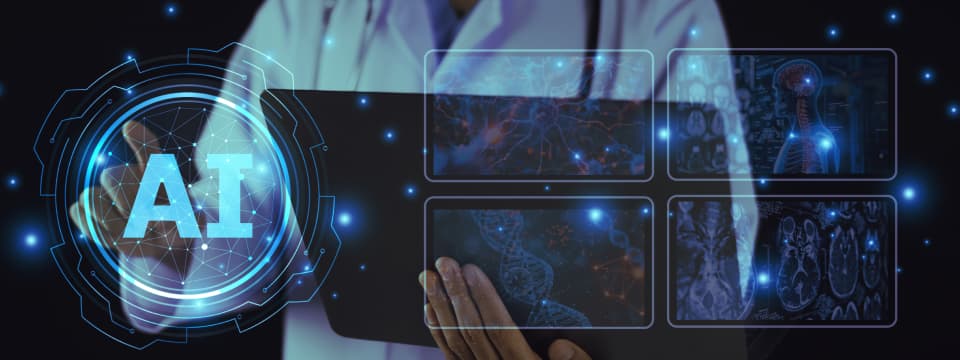Key Strategies:
- Hyperlocal Targeting: AI uses predictive data to pinpoint the right communities for your marketing efforts.
- Educational Content Creation: Utilize AI to generate content that addresses common health concerns, fostering trust from the outset.
- Predictive Analytics: AI tools forecast health trends, enabling proactive outreach to the right patient segments.
To better understand the TOFU funnel stage, let’s see how this plays out with a real-world example.
Example: Banner Health, a nonprofit healthcare system based in Arizona, utilizes AI-powered call tracking and analytics to optimize its media spending. By predicting upcoming health trends, such as flu season, Banner Health can tailor their marketing efforts in advance and position its services before demand peaks. This predictive approach ensures they reach the right patients at the right time, reducing costs while maximizing the impact of their campaigns.
Key Strategies:
- Conversational AI: Implement AI-driven chatbots or virtual assistants to engage patients in real time, answering questions and guiding them through their decision-making process.
- Smart Nurturing Journeys: Design automated email, SMS, and website interactions that deliver content tailored to a patient’s behaviors and preferences.
- Dynamic Content Personalization: Utilize AI to dynamically adjust content in real-time based on the patient’s interaction history, resulting in a more personalized and meaningful experience.
Let’s examine how this is implemented in practice.
Example: Cera Care, the UK’s largest HealthTech company, utilizes AI-backed tools to predict and prevent hospitalizations among older and vulnerable individuals. Their Hospitalisation Predict-Prevent tool forecasts more than 80% of health risks in advance, reducing hospitalizations by up to 70%. Additionally, Cera’s AI tools, such as the Falls Prevention AI, predict 83% of falls in advance, enabling proactive care and enhancing patient safety. By leveraging AI, Cera Care personalizes patient engagement, guiding individuals through their healthcare decisions and fostering a more informed and proactive approach to care.
Key Strategies:
- Frictionless Appointment Booking: Utilize AI to streamline the appointment process, offering seamless scheduling options through digital tools like chatbots or automated scheduling platforms.
- AI-Powered Testimonials: Personalize social proof by selecting and displaying patient testimonials that resonate with the individual’s concerns or condition, building trust at critical decision-making moments
- Predictive Call-to-Actions: Utilize AI-driven insights to identify the optimal moments for patient calls to action, thereby increasing conversions at key points in the funnel.
Let’s explore how this is applied in the real world.
Example: Cedars-Sinai Connect is an AI-powered mobile app that simplifies patient care by integrating chronic, preventive, and on-demand services. It streamlines the intake process, allowing clinicians to focus on care while seamlessly syncing patient data with Cedars-Sinai’s health record system for coordinated, efficient treatment. This solution targets patients ready to engage with a fully integrated, tech-driven healthcare experience, driving immediate action and adoption.
Key Strategies:
- Churn Detection: AI analyzes patient data to detect early signs of disengagement, allowing healthcare providers to intervene proactively and retain patients before they leave.
- Proactive Engagement: Send personalized health reminders, follow-up messages, and wellness tips to patients tailored to their specific needs, fostering ongoing relationships that extend beyond the appointmen>
- Community Building: AI can foster community-driven engagement by identifying and connecting like-minded patients, allowing them to share experiences and build trust with your brand.
Let’s better understand how this stage works with a real-world example:
Example: Your.MD, a digital health technology company, utilizes AI-powered chatbots to deliver personalized health advice. By continuously providing tailored content, the platform strengthens patient relationships long after the initial consultation, improving overall satisfaction and fostering loyalty. Through proactive engagement, AI ensures patients feel supported and valued, leading to stronger retention and advocacy.
Conclusion
Understanding how AI transforms the healthcare marketing funnel is essential to optimizing patient engagement and driving long-term success. From predictive AI at the top of the funnel to personalized journeys in the middle, and precision conversion strategies at the bottom, AI enables healthcare providers to tailor every interaction and create lasting patient relationships. The Loyalty Loop ensures proactive care and engagement, building trust and loyalty that extends beyond the first visit.
Whether you’re a healthcare provider seeking to enhance patient experience, improve retention, or leverage AI for more effective marketing strategies, optimizing your AI-driven healthcare marketing funnel is crucial for future growth. If you’re seeking an experienced partner to streamline your healthcare marketing efforts—from implementing AI solutions to enhancing patient engagement—ZealousWeb is here to assist. Connect with our expert team to explore AI-powered digital marketing solutions for healthcare, designed to create a more personalized, efficient, and patient-centric experience.















